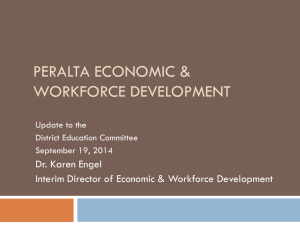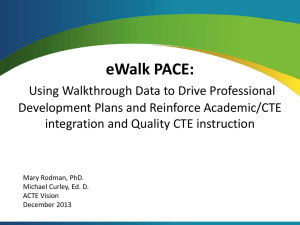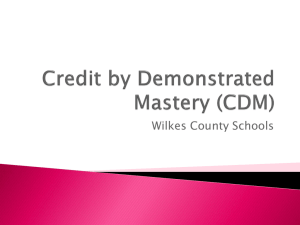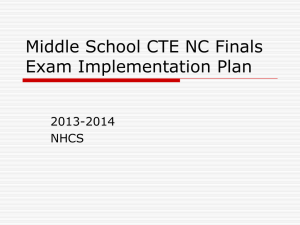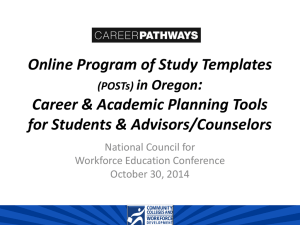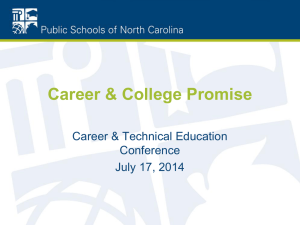currently - Kansas State Department of Education
advertisement
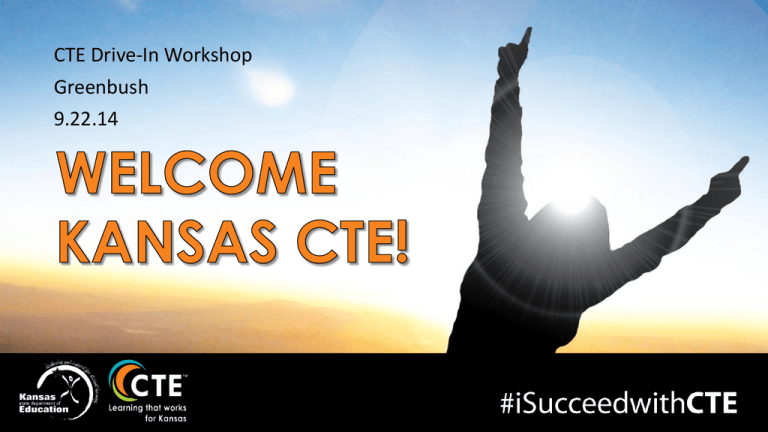
CTE Drive-In Workshop Greenbush 9.22.14 RJ Dake Don Gifford Martin Kollman Kirk Haskins Kurt Dillon Housekeeping This Morning – General Session until 10:15 followed by a Break and then Breakout sessions (color-coded) Lunch from 11:45 to 12:45 This Afternoon – Cluster Updates from 12:45 to 2:00 followed by Wrapup and Door Prizes at 2:20 2:30 – Safe Travels Home Objectives for Today 1. Assess a current Pathway in 4 component areas: a. Partnerships b. Physical Environment c. Professional Development d. Instructional Practices 2. Begin developing a Pathway Improvement Plan based on results of the Pathway assessment rubric 3. Obtain answers to your CTE burning questions Takeaways CTE Swag Another resource for highquality CTE Professional Development An action plan to engage your advisory committee and build a meaningful, strategic 3 year Pathway Improvement Plan A better understanding of CTSO’s and their important role in preparing students for College and Career The most current and up-todate information specific to your Cluster area KSDE CTE Team Purpose Support and empower schools in developing quality pathways that lead students to college and career readiness Vision We will remain a national leader in CTE. We will meet the workforce needs of Kansas. Kansas CTE leading the way….. QUANTITY 2298 Pathways in 13-14 2471 Pathway in 14-15 22,763 CTSO students in 12-13 23,653 CTSO students in 13-14 Statewide Articulated Agreements: 13-14 = 73 14-15 = 91 QUALITY 1. Partnerships 2. Professional Development 3. Instructional Practices 4. Physical Environment 5. Student Outcomes Success of Senate Bill 155 2011 2012 3,475 3,870 6,101 8,208 28,000 28,161 44,087 60,799 (Public & Private) 548 711 1419 $ Incentives for Credentials $0 HS Headcount College Credit Hours # Credentials # Districts Participating – Credential Incentives only 2013 2014 $ 694,167 $ 1,419,000 108 160 • In 2014, College CTE courses taken by HS students - a 112% increase in headcount and 116% increase in college credit hours over the baseline year (2012) • 1,419 secondary students earned industry-recognized credentials leading to a high demand occupation - an increase of 159% over the 548 credentials earned the baseline year (2012) • Major areas for secondary student certifications: 73% Health; 9% Construction; 7% Manufacturing; 6% Automotive; 4% Agriculture Kansas Workforce Needs 1. Higher percentage of post-secondary education completers (most of the “new” jobs will require a credential and/or an Associate’s degree) 2. Higher skilled employees Here’s what we’re facing… Current % of Post-secondary completers in Kansas 52% Post-secondary completion = Credential through Advanced degree Post-Secondary Enrollment % Kansas Class of 2007 80.6% % Completing 1 year of college credit Kansas Class of 2007 69% Degree Completion Kansas Class of 2007 45% DNF a post-secondary degree Kansas Class of 2007 55% Think – Pair - Share What are some of the reasons over half of our students who start in post-secondary don’t complete a degree? What can we do in secondary education to cause more students to complete a postsecondary degree? College and Career Ready in Kansas College and Career Ready means an individual has the academic preparation, cognitive preparation, technical skills, and employability skills to be successful in postsecondary education, in the attainment of an industry recognized certification or in the workforce, without the need for remediation. Closing the Gap Focus on Career Awareness & Guidance and CTE Pathways to help more students complete a post-secondary credential or degree Review Pathway Standards to ensure they are relevant, rigorous, and reflective of current business/industry standards Statewide Update Accreditation Rigor Relevance Relationships Responsive Culture Results ESEA Waiver Approved for 14-15 Assessments K – 12 CTE Accreditation Components • • • • • • Career Awareness & Guidance Innovation Instructional Practices* Integration Partnerships* Strategic Planning • Support & Recognition * also component for Pathway “accreditation” Career Pathways Assessment System (cPass) General CTE Assessment summative college/career ready assessment measures academic, 21st century skills, leadership, employability Comprehensive Agriculture Assessment measures technical skills in Ag Career Pathways Assessments System (cPass) On the Horizon…….. Animal Systems Plant Systems Manufacturing Production Design and Pre-Construction Finance Comprehensive Business Marketing Kansas Center for Career and Technical Education Greg Belcher, Director Objective One of KCCTE Summer 1st All Cohort Groups would follow this schedule: Fall Spring TTED 193 New Instructor Workshop (one week) TTED 445/845 Curriculum Development TTED 391/893 Student Assessment Development TTED 479/779 Techniques for Teaching Technical Education TTED 308/708 Tool and Lab Safety TTED 695 Using Technology as an Instructional Tool TTED 731 Adult Learners TTED 608/808 Work-based Learning TTED 698 School Improvement Processes TTED 697/897 Teaching Special Needs Students TTED 694/894 History and Philosophy of CTE Year 2nd Year 3rd Year TTED 780 Classroom and Laboratory Management in CTE TTED 483/873 Teaching Internship Objective Two of KCCTE • On site mentorship of new CTE teachers • Is to provide assistance to the new CTE teachers where they need help most • Is not an evaluation of the new CTE teacher Objective Three of KCCTE • Content specific workshops • Example: Teacher who teaches within a Construction pathway and wants to add a course on Plumbing Technology • Updates with industry current technology • Plan to have curriculum that could be used by the CTE teacher • Only cost associated with these workshop will be travel and lodging Objective Four of KCCTE • Web-based presence where CTE teachers can download resource materials • Will also allow CTE teachers to share best practices with other CTE teachers • Will develop databases of the different CTE teachers so information regarding workshops and/or Center services can be shared appropriately Career & Technical Student Organizations Kansas State Department of Education What is a CTSO? Purpose of a CTSO? Be an integral part of Classroom Instruction To help students develop understanding of industry and technology while learning teamwork and leadership skills To support and enhance related school-based and work-based learning To contribute to the preparation of a world-class workforce To prepare members for the challenges of a dynamic world To develop relationships CTSO Core Values Commitment Professionalism Conviction Recognition Education Service Integrity Teamwork Leadership CTSO Foundation Knowledge & Skills CTSOs are Intra-Curricular All Kansas Career and Technical Student Organizations are IntraCurricular; all activities are linked to what is learned in the classroom. How Do CTSO’s Keep Students in School? Students are able to apply classroom knowledge to a real world hands-on setting Students have the opportunity for a leadership role Students discover a wide range of career options Prepare students to be college and career ready Making an Impact Students who participate in a CTSO demonstrate higher levels of: Academic engagement and motivation Civic engagement Career self-efficacy Employability skills Educational aspirations Grade point averages They are more likely to be enrolled in college at 21 than others All CTSO’s Develop People & Teamwork Skills Develop Leadership and Professional Development Provide Citizenship and Communication Skills Develop Responsibility Provide Career-Related Training Develop Sense of Community and Volunteerism Promote Career Awareness Link Academic Work to Technical Work Develop Problem Solving & Critical Thinking Skills Benefits for Students CTSO experiences bring relevance to their classroom Global Awareness Opportunity for travel & recognition Develop 21st Century Skills Networking Scholarship opportunities Benefits for Advisors Engaged and Motivated Hands-on learning component Encourages parental involvement Professional Development Professional Networking Benefits for Schools Increase student interest in learning Promotes positive community & school relationships Publicizes the value of CTE & Academics to students Enriches classroom & learning activities Recognition Benefits for Communities Prepares students for community responsibilities Increased attitudes towards youth & education Lends support for community projects & activities Benefits for Business & Industry Expands the workforce Trained & capable & reliable workers Internships Networking Competitive Events Directly contribute to every student being college & career ready when they graduate from high school. Opportunities BPA DECA FBLA FCCLA FFA HOSA SkillsUSA TSA Kansas Membership 2013-2014 24,000 Where might you fit? BPA - Business Education pathways DECA – Marketing pathways FBLA – Business Education pathways FCCLA – Family & Consumer Science pathways FFA – Agricultural pathways HOSA – Health Sciences pathways SkillsUSA – Trade, Industrial & Technical pathways TSA - Technology pathways Indicators 1. 2. 3. 4. 5. Is the instruction balanced between classroom & Lab instruction, experiential learning and leadership & personal development? Are authentic student experiences integrated into instructional methods? Is experiential learning and leadership development and personal growth integrated into the instructional program? Instruction is centered on industry standards, academic and technical skill attainment with demonstration of strong employability skills. Instruction methods and resources meet the learning styles and needs of all students. Contact your CTSO! BPA: Emily Sanders-Jones, 785-296-1074 www.bpa.org esanders-jones@ksde.org DECA: Emily Sanders-Jones, 785-296-1074 ■ www.deca.org ■ esanders-jones@ksde.org FBLA: Connie Lindell, 785-760-1038 ■ www.fbla-pbl.org ■ cnlindell@aol.com FCCLA: Pam Lamb, 785-296-2164 ■ www.fcclainc.org ■ plamb@ksde.org FFA: Mary Kane, 785-532-6424 ■ www.ffa.org ■ mrkane@ksu.edu HOSA: Wendy Pickell, 785-296-3860 ■ www.hosa.org ■ wpickell@ksde.org SkillsUSA: Becky Warren, 620-820-9367 ■ www.skillsusa.org ■ bwarren@ksde.org TSA: Carolyn Cole, 620-340-3766 ■ www.tsaweb.org ■ cole4kstsa@gmail.com Break Time Creating A Quality Pathway Improvement Plan Breakout Sessions will convene after the Break Sessions begin again at 12:45 p.m. Objectives for Today 1. Assess a current Pathway in 4 component areas: a. Partnerships b. Physical Environment c. Professional Development d. Instructional Practices 2. Begin developing a Pathway Improvement Plan based on results of the Pathway assessment rubric 3. Obtain answers to your CTE burning questions Takeaways CTE Swag Another resource for highquality CTE Professional Development An action plan to engage your advisory committee and build a meaningful, strategic 3 year Pathway Improvement Plan A better understanding of CTSO’s and their important role in preparing students for College and Career The most current and up-todate information specific to your Cluster area DOOR PRIZES
